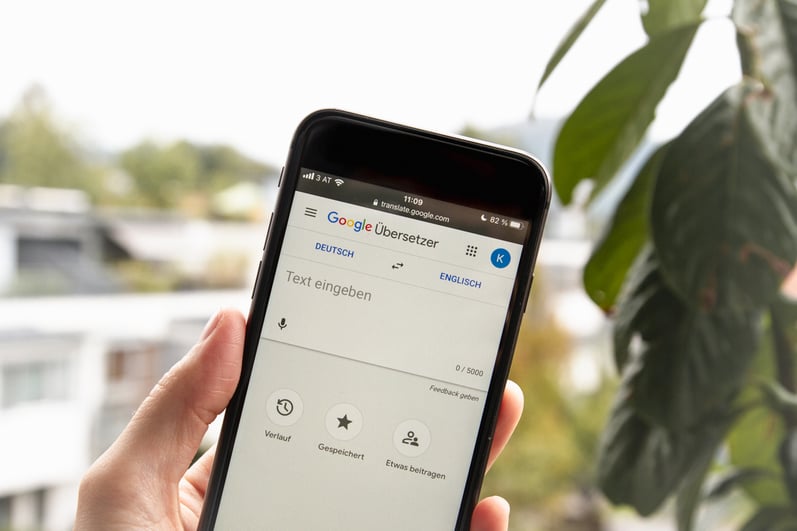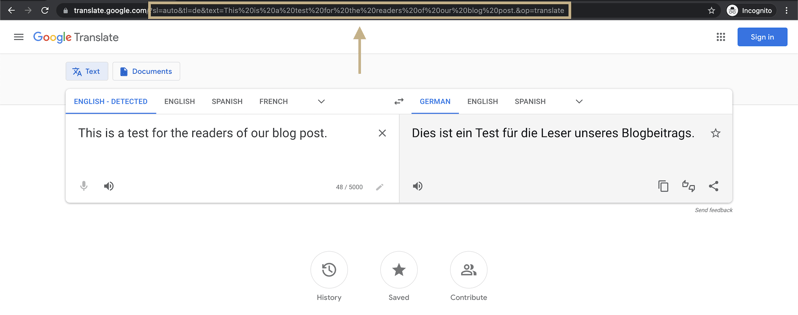
Free machine translation providers – are they a good idea? Being careless with free machine translation services can have far-reaching consequences: confidential information can become public and be misused for criminal purposes. MEINRAD explains three potential risks you should be aware of, and gives some top tips for using Google Translate, DeepL and other machine translation engines safely.
Given how many machine translation providers there are now, it’s very tempting to quickly copy an e-mail to your German colleague or a response from a Russian business partner into Google Translate and get the translation back within seconds. And why would you spend money getting an agency to translate your operating instructions when you can use DeepL or other engines to do it yourself? It all sounds so easy – but it comes with a few risks which many people never consider.
Sensitive information is out there for everyone to see
Hardly anyone thinks of the downsides of running a few sentences through a machine translation engine. But they should! We imagine no one would decide to print out a commercial e-mail, letter or contract excerpt and distribute it outside their company, yet that’s what happens when machine translation is used carelessly – effectively, sensitive information is trumpeted to the world. If you’re thinking of using free machine translation services, there are three main risks (some of which are covered by the terms of service) you should be aware of.
Risk 1 – Espionage
Someone else can access your data!
A report produced by the Australian Strategic Policy Institute (ASPI) illustrates how China uses state-owned companies and state-owned shares in companies to gather data about users outside China. In particular the author of the ASPI report highlights the neural machine translation provider GTCOM, which has very close economic links with the Central Propaganda Department. So when choosing a machine translation provider, you should look closely at who owns the company in order to identify potential conflicts of interest at an early stage.
Risk 2 – Data leak by the provider
All internet users can access your data!
In 2017 the employees of a Norwegian oil and gas company discovered by chance that simple Google searches were revealing highly sensitive information about their business. This nightmare scenario was caused by numerous employees using the free tool Translate.com without thinking of the consequences – many of their translation queries were indexed by Google, which meant they came up as results of Google searches. The texts that were now available around the world included passwords, contracts, names, addresses, letters of dismissal, staff reduction plans and much more. And it was all legal. The terms of service made clear that Translate.com does not guarantee that the information entered will not be made public and that all texts entered in Translate.com are used to improve the service.
And beware: This has not changed.
Risk 3 – Hacker attacks
Criminals can access your data!
When you enter text in Google Translate, DeepL or similar freely accessible MT tools, the text is shown in the URL together with the selected language pair. The URLs you visit can then be seen in your browser history.
Hackers know how to exploit this, and sometimes when targeting a business they get lucky immediately and get hold of login details or confidential information which helps them with social engineering (spying on and manipulating victims).
How to use free machine translation tools safely
With these risks in mind, is there any way free machine translation tools can be used relatively safely? Yes there is, as long as you bear a few things in mind.
One is the type of text and what you plan to use it for. All texts intended to be freely and publicly accessible online can be translated using free machine translation services without any concerns – though the only data you enter into these engines should be content that does not allow confidential information about individuals to be identified, given the risk of de-anonymization of browser data.
| Top tips for using free MT tools securely | |
| Sentences with no traceable words | Sentences with traceable words |
| Single words | Entire documents |
| Texts intended to be freely and publicly accessible online |
Texts containing confidential information |
| Anonymized/pseudonymized texts containing no confidential information | Texts containing personal data |
Strict guidelines and regular training to raise awareness can help in-house staff use free machine translation tools relatively safely. However, the cost-benefit calculation will show that there are clear and compelling reasons not to use free machine translation providers and instead to get the IT department to block or restrict all business use of these tools. A machine translation self-service portal provided by a translation agency (using secure, fee-based MT software) will give you better value and be a safer alternative.
Want to find out more about machine translation and data security? Our e-book explains the pros and cons of the biggest machine translation providers, and much more.
Main Image: © MEINRAD



